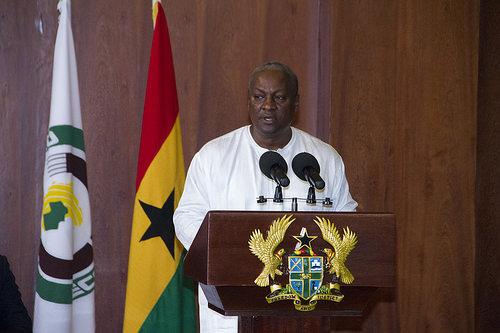
President John Mahama congratulating seven new judges of the ECOWAS Community Court of Justice after they were sworn into office in Accra
President John Dramani Mahama has said Ghana is looking to build a partnership with the International Monetary Fund (IMF) to restore macroeconomic stability.
That, he said, was key because, “private investment wants to see that the macroeconomic environment is predictable and stable”.
Answering a question on IMF and the Ghanaian economy during a Presidential Panel Discussion today with other heads of state to open The Global African Investment Summit in London, President Mahama said…“ Ghana is not the kind of country it was when we first went to the IMF in the 80s and I think the IMF is not the same organization it used to be. It was President Kaunda who said the IMF was like a madman whether you had malaria or a broken leg they gave you quinine”.
He said: “…we are also looking to transform the structure of our economy to make it more robust so that we don’t have these cyclical booms and busts depending on what happens to international commodities on the world market.”
According to him, “The current instability we are going through is partly because of the collapse of cocoa prices and gold prices and those are our key exports. So we suffered a loss of revenue of about US$1.5billion in the space of about one and a half years. For an economy like ours that is significant revenue. So creating more pillars on which our economy can stand is one of the things we are looking at both in terms of opening up new sectors like the oil and gas sector.
“We are giving out more exploration licenses and those are sectors better left to the private sector because they can leverage their investment to put in there. So we are doing that. Energy and power- both the state and the private sector are creating an environment where we all can invest”.
Mr Mahama said one of the major game changers for the country was bringing onshore its own natural gas from the jubilee field and the other fields that had been discovered.
“We have finished the processing plant and we are going through the process of tying it into the FPSO in the Jubilee Field that should bring some 120million standard cubic feet of gas for power generation, which can produce about some 500MW of power, and it is critical for us because of the fluctuation in the operation of the West African Gas Pipeline,” he noted.
Source: Flagstaff House Communication























